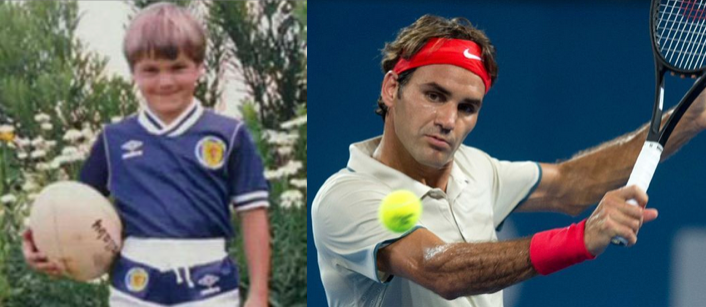IMPROVE MY GAME
Articles
Time Required for Developing Expertise and the 10 Year Rule
10 Year Rule
One of the first questions most golf coaches will get asked from new students is; “How long is it going to take until I am proficient at this game?” That simple question has been the subject of many years of research from leading minds in the industry of motor skill development. Many experts believe that it takes a minimum of 10 years and at least 10,000 hours of training for an athlete to reach elite levels. This is an idea that became widely popularized through Malcolm Gladwell's book Outliers. Herbert A. Simon (Nobel Prize - 1976) was interested in the role of knowledge in expertise. He was the first to say to become an expert required about 10 years of experience. He and his colleagues estimated that expertise was the result of learning roughly 50,000 chunks of information.

In Tim Gibbons and Tammie Forster’s landmark study for the United States Olympic Center’s Athletic Development Program, “The Path to Excellence,” they provided an in-depth look at the development of U.S. Olympians who competed between 1984 and 1998.
Here are a few of their conclusions:
- U.S. Olympians begin their sport-specific participation at the average age of 12.0 for males and 11.5 for females.
- Most Olympians reported a 12- to 13-year period of talent development from their sport introduction to making an Olympic team.
- Olympic medalists were younger — 1.3 to 3.6 years — during the first 5 stages of development than non-medallists, suggesting that medalists were receiving motor skill development and training at an earlier age. However, caution must be taken not to fall into the trap of early specialization in late specialization sports.
In 2014, the USOC completed a similar study and found that multi-sport tendencies we incredibly strong among Olympians:
US Olympians played an average of 3 sports between ages 10 - 14 (via @TeamUSA @DrBradDeWeese): http://t.co/OyoBjZjJn2 pic.twitter.com/V6ZhUvFVRO
— TPI (@MyTPI) June 22, 2015
The 10-year rule has been shown to also apply to the development of expertise in other domains including music (Ericsson, Krampe, & Tesch-Römer, 1993; Hayes, 1981; Sosniak, 1985), mathematics (Gustin, 1985), swimming (Kalinowski, 1985), distance running Wallingford, 1975), tennis (Monsaas, 1985), soccer and field hockey (Helsen, Starkes, & Hodges, 1998).
Unfortunately, most data suggest that golf is a 20-year developmental sport, not 10 years. Research by the PGA of GB & I came up with an average of 21.5 years to become a winner on the PGA or European Tour.
On the other hand, the 10,000-hour rule is still highly debatable in the research (some show 4,000 hours – some show 6,000 hours), but all studies suggest a significant investment in time is required. Much of the debate about how many hours is required is due to the lack of agreement between experts on what they consider practice. Let’s talk about the different forms of practice verses play.
Practice and Play Definitions
It is imperative for kids to practice if they want to get better. And by the sounds of the information presented earlier, they need to do a lot of it. The question is, “What type of practice is best?”. Many experts in motor learning and skill acquisition have tried to answer this question. Ericsson, Krampe and Tesch-Römer (1993) did a comprehensive review of this topic and concluded that the most effective learning occurs through involvement in a highly structured activity defined as ‘deliberate practice’.
Ericsson defined deliberate practice as, “activities that have been specifically designed to improve the current level of performance. Deliberate practice requires effort and is not inherently enjoyable.” In other words, it is hard work, has few immediate rewards and the motivation to perform deliberate practice is getting better - not having fun.
Côté and Hay (2002) emphasized the importance of ‘deliberate play’ (as opposed to deliberate practice) in the early years of elite athletes. This view is shared by many other researchers (Bloom 1985, Carlson, 1988)
Deliberate play activities are those designed to maximize enjoyment. Deliberate play activities have simple rules (sporting rules) that are enforced by the children or adult involved in the activity.
So here is the question, “Is deliberate play also a form of practice?” I think the answer is a definite “YES”.
Children love to play games. Through playing games they have an important means to express, explore and discover many aspects of life relative to themselves and others. Playing games can be a means of physically developing fundamental movement skills and simultaneously enabling children to learn about cooperation, competition, communication, relationships, equity and the meaning of success.
Numerous motor skills are best learned through extensive repetition of proper form - deliberate practice. But drills can get boring. Kids don’t want to practice. They want to play. Try to turn practice into play for the younger children.
While there are numerous models of this on TOUR, Jordan Spieth is a fabulous example in many regards. Spieth credits his skills and touch with playing rounds instead of banging balls on the range ("I'm not a range rat," he says). Additionally, he's an example of how you don't need to spend all of your development time IN GOLF. He developed much of his athleticism in other sports:
Spieth played QB, PG and pitcher in addition to golf. Parents should read this from @MyTPI http://t.co/UyaCcORygS pic.twitter.com/G4YogjwRCW
— Ben Crane (@bencranegolf) August 16, 2015
So here is the deal. Kids need to get about 20 years of practice under their belt if they want to make it to the PGA Tour. The good news is, deliberate play and deliberate practice both count towards those hours. So if they play multiple sports when they are young, they are racking up valuable hours towards their 20-year goal. They should start to shift towards deliberate practice by their teenage years, but that is when golf becomes more fun to them anyway!